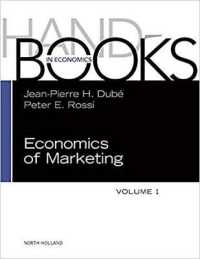- ホーム
- > 洋書
- > 英文書
- > History / World
基本説明
Through creative use of account books, inventories, wills, and other records, Renata Ago examines early modern attitudes toward possessions, asking what people did with their things, why they wrote about them, and how they passed objects on to their heirs.
Full Description
We live in a material world - our homes are filled with things, from electronics to curios and hand-me-downs, that disclose as much about us and our aspirations as they do about current trends. But we are not the first: the early modern period was a time of expanding consumption, when objects began to play an important role in defining gender as well as social status. "Gusto for Things" reconstructs the material lives of seventeenth-century Romans, exploring new ways of thinking about the meaning of things as a historical phenomenon. Through creative use of account books, inventories, wills, and other records, Renata Ago examines early modern attitudes toward possessions, asking what people did with their things, why they wrote about them, and how they passed objects on to their heirs. While some inhabitants of Rome were connoisseurs of the paintings, books, and curiosities that made the city famous, Ago shows that men and women of lesser means also filled their homes with a more modest array of goods.
She also discovers the genealogies of certain categories of things - for instance, books went from being classed as luxury goods to a category all their own - and considers what that reveals about the early modern era. An animated investigation into the relationship between people and the things they buy, "Gusto for Things" paints an illuminating portrait of the meaning of objects in preindustrial Europe.








